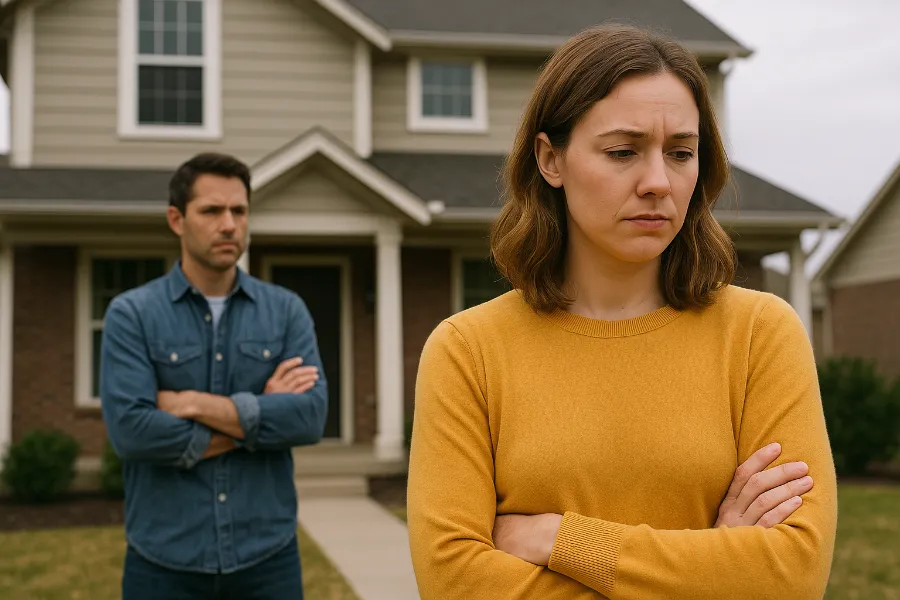
The American Psychological Association made recent estimates that 41% of the first marriages in the United States will be divorced by the year 2025. This figure indicates that, despite divorce being a common phenomenon, a majority of first marriages or unions still prefer to cohabitate. Among the issues that come with divorce is the question of what happens to the family home. The majority of individuals consider their residence a stronghold. The dwelling preserves the loved ones’ memories and is a safe place for you and your kids.
In case one of you or your partner is keen on retaining the house, then it’s important to first comprehend your legal rights, financial interests, and long-range goals before coming to a decision. Buying your spouse out of the house and getting their share of it demands thoughtful arrangement and appraisal. Let’s check the major actions you should take if you or your partner wants sole ownership of the property.
Open the Lines of Communication
When your spouse wants the house, usually the lines of communication have to be opened so that both of them feel they have been heard. Sit down somewhere comfortable and communicate freely.
Talk about your feelings toward the house and why these matters mean a lot to you. Ask something in return: “what about you?” The other would then share his or her feelings. In the meantime, try to listen. Let each other hear them and express their points. If feelings and concerns can be expressed freely, the communication ties between both of you will improve.
You can also consult an attorney about buying the house since most people have significantly more positive divorce outcomes when they hire an attorney, according to divorce lawyer Bryce Kinley. A dialogue is very important for understanding the thoughts of the other party and coming up with workable ideas in light of this knowledge.
Assess Financial Implications
Before any arrangement is settled over the house, you must look at the financial picture. Take into account the mortgage balance, tax payments, and monthly payments. Using this information, you can determine whether the property falls within your comfortable affordability range for single-person ownership, taking into account your earnings and expenditures.
If a separation agreement is involved, it’s especially important to outline financial responsibilities clearly. Then there will be maintenance costs and maybe repairs. You would discuss equity, refinancing, and anything else associated with financing if you do decide to buy or keep the house. Keeping all that on the table financially could avert a lot of arguments down the road. Discussion of these things will guide you in deciding which aspect is most important to all of you and will be beneficial to your finances.
Consider the Emotional Impact
The emotional impact of owning the house can also be evaluated in financial terms. Most houses hold a great deal of memories, including family reunions and joyous occasions.
There is certainly an attachment toward these spaces. Ask yourself if being there will comfort you or remind you painfully of what has changed. Remember, your emotional health counts. If you consider taking over the house, then do think of making new memories in it. If it feels like letting go is opening a new door, let it happen. An option must be identified to help the individual heal and move on from their sense of belonging to the place. The sense of belonging must be put first.
Explore Legal Options
In case you are in a dilemma regarding the decision of whether to keep the house or not, it is wise to investigate your legal alternatives. First and foremost, do a background check on the laws of your state regarding property division. The house might be classified as marital property, which will influence the chances of you keeping it.
Get a family lawyer to tell you your rights and duties. They will also help you assess value and financial matters such as mortgages or liens. If you decide to keep the house, you could definitely think of refinancing options. Knowledge of your legal rights gives you power and stands as a good foundation on which to build the next steps in this movement.
Negotiate a Fair Agreement
A major factor in the future of the shared dwelling is settling an agreement that somehow looks fair to the requirements and needs of both families. Start with discussing priorities, such as whether you consider money to be your main concern or perhaps the emotions or future plans, while also listening to yourself. Understanding their positions will contribute toward effective collaboration. Discuss value, mortgage payments, and maintenance costs! Perhaps you will be able to agree on buyout prices in case one is staying.
As soon as the slightest sign of aggressiveness appears, you should request the mediation of a third party. Their participation will help maintain fairness in the discussion. A fair agreement could be produced if both parties are clear with each other’s goals regarding the property.
FAQs
Start by opening communication and discussing emotional and financial implications before making any decisions.
Yes, but it depends on your state’s property laws and whether both parties agree or a court rules in favor of one spouse.
A buyout means one spouse pays the other for their portion of the home’s equity, becoming the sole owner.
The value is usually established through a professional appraisal to ensure a fair division of assets.
You may need to sell the property, refinance, or negotiate other assets in exchange for your spouse’s share.
While emotional ties matter, financial stability and legal ownership weigh more heavily in final decisions.
Yes, in most cases. Refinancing removes your spouse’s name from the mortgage and places full responsibility on you.
A lawyer ensures your rights are protected, helps with legal documentation, and negotiates fair terms.
Yes. Mediation often helps reach mutual agreements faster and avoids costly litigation.
The court may order the property to be sold and the proceeds divided according to state law.













